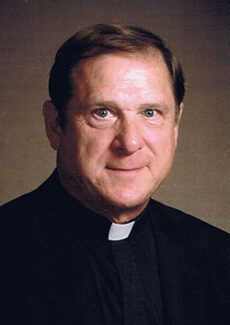Scenes from the Passion account move from conflict to consolation — and hope

Father R. Michael Schaab
Living the Word / By Father R. Michael Schaab
Palm Sunday of the Lord’s Passion / April 10
(At the procession with palms) Luke 19:28-40
(At the Mass) Isaiah 50:4-7; Psalm 22:8-9,17-18,19-20,23-24; Philippians 2:6-11; Luke 22:14 — 23:56
This Sunday’s passage from Luke’s Gospel records the last two days of the earthly life of Jesus. The account of the Passion can be broken into a series of scenes in which Jesus is always the focus and his interaction with others moves gradually from conflict to consolation. Along the way, there is confusion about kings and the Kingdom, and, most importantly, there is the long-standing argument about Jesus calling God his Father. “For this reason they tried all the more to kill him, because he not only broke the sabbath but he also called God his own father, making himself equal to God.” (John 5:18)
The Upper Room: The importance of the institution of the Eucharist at the Last Supper seems not to have impressed itself upon those present, for it takes place in the midst of Jesus announcing that one of his disciples will betray him, followed immediately by the disciples debating about who the betrayer might be, which then develops into an argument regarding who of them might be the greatest. Jesus takes advantage of this situation to teach them the difference between earthly kingdoms and the kingdom he confers on them. He confers this kingdom because God has already conferred it on him, and here he privately refers to God as “Father.”
Finally, he points out that everything he is saying demands faith, and Simon is warned about the weakness of his own faith at the same time that he is charged with the responsibility of strengthening the faith of his brothers.
Arrest at Mount of Olives: More conflict. Jesus speaks to his disciples about preparing to be tested. Then in prayer, again calling God his “Father,” he receives the consolation of an angel sent to strengthen him. But the disciples are still confused. They awake from a nap only to face “the chief priests and captains of the Temple guard and elders,” led by Judas. After a confrontation that escalates into violence, Jesus provides consolation by healing a wounded guardsman. Then he is arrested.
Trials before Sanhedrin, Pilate and Herod: This series of trials begins with the Lord’s prediction about Peter’s weak faith coming true, three times denying he even knew Jesus. Before the Sanhedrin, the elders accuse Jesus of claiming to be equal to God. That’s the real import of their question to him, “Are you then the son of God?” His noncommittal answer is all they need to condemn him on theological grounds.
But when they all rise up and take Jesus to Pilate, things change. Now the charge becomes one of a political nature rather than a religious one. They claim he “maintains that he is the Christ, a king,” and therefore opposed to the Roman emperor. When Pilate interrogates him, Jesus gives the same noncommittal answer he gave to the Sanhedrin, but this time it prompts the opposite reaction. Pilate says, “I find this man not guilty.”
Realizing he was not dealing with a legal question but rather was in conflict with a crowd that was becoming more and more unruly, Pilate looked for a way out of the dilemma he found himself in. He sent him to King Herod hoping he would somehow deal with the situation. When that failed and Jesus once again stood before him awaiting his judgment, Pilate’s first instinct was to flog Jesus and then release him. But the crowd was relentless in demanding both conviction and execution. In the end, giving into personal fear and acting against his own conscience, a conflicted Pilate “handed Jesus over to them to deal with as they wished.”
Way of the Cross: Before and during these trials, those “who held Jesus in custody were ridiculing and beating him.” So when it came time for him and two condemned prisoners to carry to Golgotha the crosses upon which they were to be crucified, Jesus was too weak to do so. The soldiers forced Simon, a Cyrenian, to carry Jesus’ cross. Along the way through Jerusalem Jesus paused to speak with women who had come out to mourn and lament his impending fate. Even while the soldiers continued to jeer him, Jesus prayed for them publicly using that name for God which had led to his condemnation by the Sanhedrin: “Father, forgive them.”
At the same time, the sign that had been ordered to hang on his cross indicating the political nature of his “crime,” inadvertently became an act of faith, “This is the King of the Jews.”
During his final minutes, Jesus spoke to the good thief, showing him what it means to be “king,” “the one who serves.” Thus, at the end of the Gospel, the focus turns from conflict to consolation. And, there’s hope, too, for everyone still learning to believe. Like Joseph of Arimathea, we can all still find a way to serve and to share in the Kingdom.
—
FATHER R. MICHAEL SCHAAB is a senior priest of the Diocese of Peoria who gives retreats and days of recollection, and who fills in as presider at parish Masses on weekends. He resides on a hobby farm in Putnam County.





